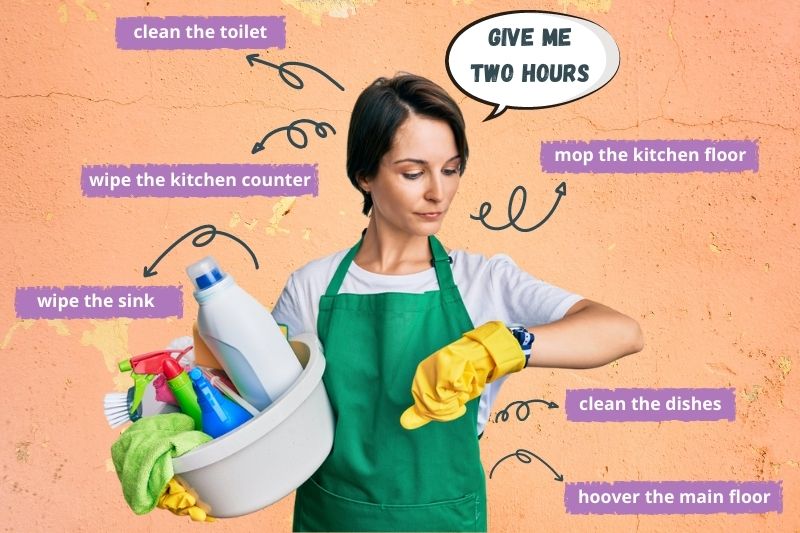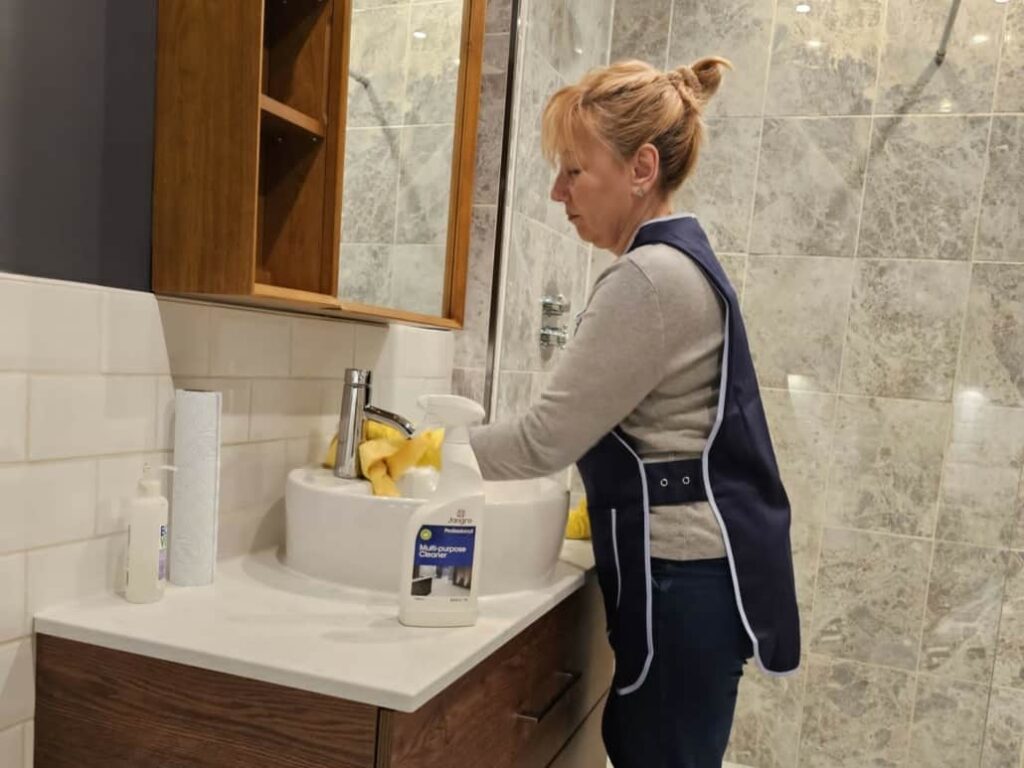So you’ve hired a cleaner and you’ve got them for a couple of hours. The question is, what should you expect them to accomplish in that time? Should they focus on the surface cleaning or tackle those hard-to-reach corners? In this article, we’ll explore some practical tips and suggestions to help you make the most of those precious two hours with your cleaner. Whether you’re looking for a sparkling home or specific tasks to be completed, we’ve got you covered.

This image is property of inthewash.co.uk.
Cleaning Tasks
Dusting
When it comes to dusting, there are a few things that your cleaner should focus on. Dusting should include wiping down surfaces such as countertops, tables, shelves, and any other furniture. It is important to not forget to dust decorative items like picture frames, lamps, and knick-knacks. Additionally, your cleaner should pay attention to high-touch areas such as light switches, door handles, and electronics.
Vacuuming
Vacuuming is a crucial task to keep your home clean and free of dust, dirt, and allergens. Your cleaner should thoroughly vacuum all carpets, rugs, and upholstered furniture in every room of your house. It is necessary to pay attention to hard-to-reach areas like corners, under furniture, and along baseboards. Don’t forget about vacuuming the stairs as well.
Mopping
Mopping is an essential part of maintaining clean floors. Whether you have hardwood, tile, or laminate flooring, your cleaner should mop all hard surfaces. This includes kitchen and bathroom floors, as well as any other rooms in your home that have hard flooring. Using a suitable cleaner for the specific floor type is crucial to ensure effective cleaning without damaging the surface.
Cleaning bathrooms
Cleaning bathrooms is often a task that requires a little extra attention. Your cleaner should thoroughly clean and sanitize all surfaces in the bathroom, including the toilet, sink, bathtub, shower, and countertops. It is important to use appropriate cleaning products and tools to efficiently remove dirt, grime, and bacteria. Don’t forget about cleaning mirrors, faucets, and towel racks as well.
Cleaning kitchen
The kitchen is another area that needs special attention during cleaning. Your cleaner should focus on cleaning the countertops, sink, stove, and refrigerator. It is important to remove any food residue, grease, and stains to maintain a hygienic and visually appealing kitchen. Wiping down cabinet exteriors and cleaning the microwave are also tasks that should be included. Make sure all appliances are left clean and tidy.
Cleaning windows
Clean windows can make a big difference in the overall appearance of your home. Your cleaner should clean windows from the inside, ensuring there are no streaks or smudges. This includes wiping down window frames, sills, and any window coverings like blinds or curtains.
Cleaning appliances
In addition to the specific kitchen tasks mentioned earlier, your cleaner should also clean other appliances throughout your home. This includes cleaning the exterior of the dishwasher, washing machine, dryer, and any other appliances that may require attention. Removing dust and fingerprints will help keep your appliances looking clean and well-maintained.
Changing bed linens
Changing bed linens is an important task to maintain a clean and fresh sleeping environment. Your cleaner should strip the bedsheets, pillowcases, and duvet covers, and replace them with freshly laundered ones. This not only keeps the beds clean but also helps with allergen control. Don’t forget to make the bed neatly as well.
Emptying trash
Emptying trash bins is a task that should never be skipped during a cleaning session. Your cleaner should empty all trash bins throughout your home, including the kitchen, bathrooms, bedrooms, and any other rooms that have garbage bins. It is important to replace the garbage bags as needed.
Organizing
While organizing may not be a typical cleaning task, it is a valuable addition to maintaining a tidy and clutter-free environment. Your cleaner should spend some time organizing items in each room, such as arranging books or magazines on shelves, tidying up toys, and organizing any other items that may be out of place. This helps to create a more organized and visually pleasing living space.
Additional Tasks
Laundry
If you have laundry that needs to be done, your cleaner can assist with this task as well. This may include sorting, loading the washing machine, transferring clothes to the dryer, folding and putting away clean clothes. It is important to communicate your laundry preferences and requirements to your cleaner to ensure they handle your laundry properly.
Ironing
Ironing is often a time-consuming task that many people prefer to have assistance with. If you have wrinkled clothing, linens, or other fabric items, your cleaner can help by ironing them. This ensures that your clothes are neat and presentable for everyday wear or special occasions.
Putting away groceries
If you have recently gone grocery shopping and need assistance with putting away the items, your cleaner can lend a hand. This includes organizing and placing groceries in the appropriate pantry, refrigerator, or freezer locations. It can be a helpful time-saver to have someone assist with this task, especially if you have a large grocery haul.
Meal prep
Meal prep can be a daunting task, especially if you have a busy schedule. Your cleaner can help by assisting with basic meal preparation tasks such as chopping vegetables, marinating meat, or portioning out meals for the week. This can save you a significant amount of time and allow you to enjoy healthy and home-cooked meals.
Watering plants
If you have indoor plants that require regular watering, your cleaner can take care of this task as well. Watering plants helps to keep them healthy and vibrant. Your cleaner can follow your instructions on how much water to give each plant and ensure they are properly cared for during their cleaning session.

This image is property of cleaning-express.com.
Deep Cleaning
Cleaning baseboards
Baseboards often accumulate dust and dirt over time and can be easily overlooked during regular cleaning. Your cleaner should take the time to thoroughly clean baseboards throughout your home. This may involve dusting them and wiping them down with a damp cloth or using a suitable cleaner to remove any stubborn stains or marks.
Cleaning ceiling fans
Ceiling fans are notorious for collecting dust on their blades, making them a potential source of allergens. Your cleaner should clean ceiling fans thoroughly by dusting or wiping down each blade. It is important to use a ladder or step stool to reach the blades safely and avoid injury.
Cleaning blinds
Blinds can accumulate dust and require regular cleaning to maintain their appearance. Your cleaner should dust or wipe down blinds to remove any dust, dirt, or stains. Depending on the type of blinds, your cleaner may need to use a specific cleaning method or product to ensure the blinds are properly cleaned and not damaged.
Cleaning inside cabinets
Deep cleaning inside cabinets is a task that should be done periodically to ensure cleanliness and organization. Your cleaner should remove items from the cabinets and wipe down the shelves, walls, and doors. This helps to eliminate any food crumbs, spills, or dust that may have accumulated over time.
Cleaning under furniture
Over time, dust, dirt, and debris can accumulate under furniture and go unnoticed. Your cleaner should move lightweight furniture and thoroughly clean the area underneath. It is important to use appropriate cleaning tools and techniques to avoid scratching or damaging the flooring.

This image is property of www.mydomaine.com.
Specific Room Cleaning
Living room
The living room is often a high-traffic area and requires regular cleaning attention. Your cleaner should focus on dusting and vacuuming all surfaces, including furniture, electronics, and decorative items. They should also pay extra attention to cleaning any spills or stains on upholstery or carpeting. Additionally, wiping down surfaces like coffee tables, TV screens, and entertainment units will help maintain a tidy living room.
Bedrooms
In the bedrooms, your cleaner should focus on changing bed linens, tidying up any clutter, and dusting surfaces such as dressers, nightstands, and lamps. Vacuuming the floors and cleaning any mirrors or windows are also important tasks. Each bedroom should be left clean, organized, and ready for relaxation.
Bathrooms
Cleaning bathrooms thoroughly is essential to maintain hygiene and prevent the growth of mold or mildew. Your cleaner should pay close attention to cleaning and sanitizing the toilet, sink, bathtub, shower, and countertops. They should also clean mirrors, faucets, and any other bathroom fixtures. Don’t forget about wiping down any shelving or storage areas in the bathroom and restocking items like toilet paper and hand soap.
Kitchen
The kitchen is often the heart of the home and requires special attention during cleaning. Your cleaner should focus on cleaning and sanitizing the countertops, sink, stovetop, and refrigerator. Wiping down cabinet exteriors, cleaning the microwave, and disinfecting high-touch areas like light switches and door handles are also important tasks. Additionally, sweeping or vacuuming the kitchen floor and mopping it is necessary to remove any spills or food residue.
Home office
If you have a home office, your cleaner should not neglect this area. Dusting and wiping down surfaces like the desk, shelves, and electronic equipment is essential. Vacuuming or sweeping the floor and emptying trash bins are tasks that should not be forgotten. Keeping your home office clean and organized can contribute to productivity and a peaceful working environment.

This image is property of tinyhandstidyhome.com.
Time Management
Prioritizing tasks
To make the most of the cleaning session, your cleaner should prioritize tasks based on their importance and urgency. This may involve discussing your specific cleaning preferences and priorities with your cleaner beforehand. By focusing on the most critical areas and tasks, your cleaner can ensure that the limited time available is used efficiently.
Following a cleaning schedule
Having a cleaning schedule can be highly beneficial in managing cleaning tasks effectively. Your cleaner should follow a pre-determined cleaning schedule, which outlines the tasks to be completed in each cleaning session. It provides structure and ensures that all necessary areas of your home are cleaned regularly. Following a schedule also helps your cleaner stay organized and focused during their time in your home.
Using time-saving techniques
Time-saving techniques can help your cleaner accomplish more within the two-hour timeframe. These techniques may include using multipurpose cleaners, using efficient cleaning tools, and following a systematic approach to cleaning each room. By utilizing time-saving techniques, your cleaner can ensure that they make the most of their time in your home and complete the required tasks to a high standard.
In conclusion, when hiring a cleaner for a two-hour cleaning session, there are a variety of tasks that can be accomplished. From dusting and vacuuming to deep cleaning and organizing, your cleaner should focus on maintaining cleanliness, hygiene, and organization throughout your home. By following a cleaning schedule, prioritizing tasks, and utilizing time-saving techniques, your cleaner can make the most of their time and ensure that your home is clean, fresh, and inviting.

This image is property of jomeiservices.com.

